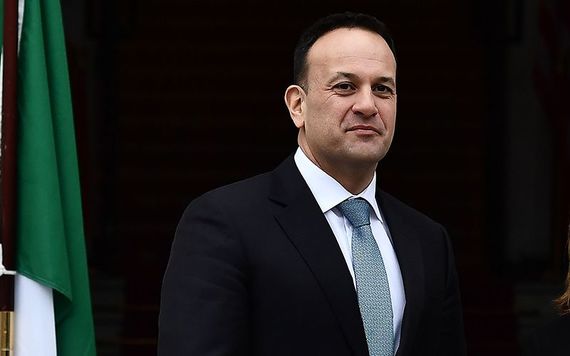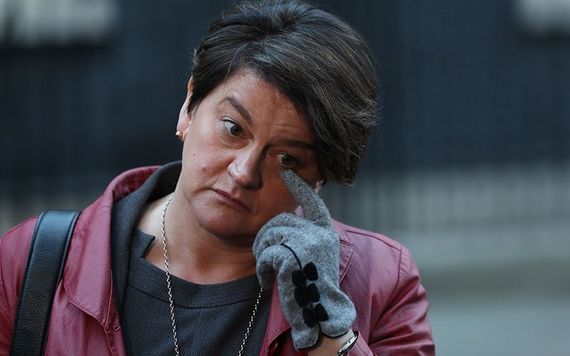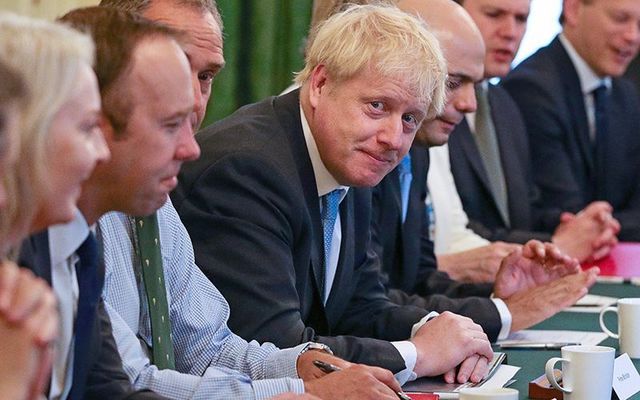Britain's new Prime Minister Boris Johnson's first week his new office left the Irish government in shock as Brexit approaches and the Irish backstop come into question
Boris Johnson got off to such a blistering start in his first week as Prime Minister last week it left the Irish government floundering around in shock. Any hope here that once he had the job he might take a more sensible approach to Brexit, and particularly to the Irish backstop, was blown away.
Instead, he doubled down, insisting that whatever it meant for Ireland or Europe, the U.K. would be out of the EU by October 31, deal or no deal. If it was no deal and a hard Brexit, so be it. Within hours of taking over, Johnson had sacked most of Theresa May's Cabinet, replacing them with Brexit hardliners. His first day in the House of Commons as prime minister was a tour de force.

Ireland's Taoiseach (Prime Minister) Leo Varadkar.
On his feet for over two hours speaking and answering questions, he rammed home his message of confidence about Britain's future after Brexit and dismissed the feeble protestations of Labour leader Jeremy Corbyn and others. It was an impressive performance whatever your view. Johnson’s resolute stance left leaders both in Ireland and the EU badly shaken. His message was crystal clear. If there is to be any chance of a withdrawal agreement, the first thing that has to happen is that the backstop is removed from the document in its entirety.
The reason, he said, is that the backstop would force Britain to stay in the EU indefinitely, or at least until the EU gave permission for the U.K. to leave. That would undermine the Brexit decision the British people made in the referendum in 2016.
Read more: Finally Boris Johnson and Leo Varadkar talk Brexit
A time limit was not enough, he said. The backstop must be abandoned altogether. This is much more hardline than May's position. Earlier this year before her final attempt to get her withdrawal agreement through Parliament, she had pleaded with the EU and Ireland to give her something to take back to Westminster.
It was clear then that if a time limit had been put on the backstop—five years was suggested—it would have been enough to get her deal through. And if that had happened, we would not now be facing the cliff edge of a hard Brexit and the border that will inevitably follow. Instead of doing that, however, the Irish government refused to give an inch. It was a colossal mistake since the vote in Westminster was only narrowly lost.

The city of Westminster, in London.
The result is that we now have to deal with Johnson and probably a hard Brexit, followed by a border in Ireland to protect the EU Customs Union. And we are facing into the economic catastrophe that a hard Brexit would cause in Ireland, both north and south.
A hard Brexit with no deal on trade or anything else now seems likely to happen in just three months. If we had been more sensible in our approach we would instead now be heading into a lengthy transition period during which nothing much would change while trade talks between the U.K. and the EU took place, talks that could have dragged on for years.
But sadly we can't rewind the clock. We are where we are, as politicians like to say. Any doubts about the seriousness of Johnson's willingness to crash out of the EU without a deal have been demolished by his actions over the past week. These included not only the appointment of his hardline Brexit Cabinet but his announcement that from now on all government decisions in the U.K. will be made within the framework of preparing for a possible no-deal Brexit.
Read more: Direct rule would be imposed on Northern Ireland in no-deal Brexit
Everything will be Brexit-tested, and the work will go on around the clock seven days a week until the U.K. leaves on or before October 31. No one any longer thinks Boris is bluffing. There was one other notable aspect to his first week as prime minister. His barnstorming performance in the House of Commons sounded more like the start of an election campaign than anything else.
There were even more of his rousing turns of phrase than usual, sounding at times like a call to arms. There were also several specific commitments, like hiring 20,000 extra police and massive spending on rail infrastructure in the north of England, among other promises on his domestic agenda. It really did sound like the first shots in an election campaign. The background to this, of course, is that even with the support of the Democratic Unionist Party (DUP), the Conservatives currently have a majority of just two in the 650-seat House of Commons, thanks to May's disastrous election in 2017. And that could be down to just one if the Conservatives lose a by-election this week.

Democratic Unionist Party leader Arlene Foster.
With so much coming down the tracks, Johnson desperately needs a comfortable majority in Parliament to implement his vision. So he needs to win an election and the timing will be critical.
Despite his assertions last week that there won't be an election before Brexit on October 31, developments over the next couple of months could tempt him or force him to change his mind. And because of that, there could still be a way out of this mess for Ireland. Johnson probably has two scenarios in mind. In the first, the EU gives him much of what he wants (including a reversal on the backstop) and he then concludes an agreement to leave the EU with a deal.
Getting that done before October 31 may not be realistic but if enough progress is being made he could accept a brief extension. Then, once Brexit has happened, he goes for an election on the basis that he has delivered and wins a thumping majority. In the second scenario, Ireland and the EU refuse to budge in the coming weeks. Johnson then calls an election in mid-September heaping blame on the EU (and Ireland) for the coming crash out and seeking a majority so that he can force a hard Brexit through Parliament.
In either scenario, if Johnson wins enough seats he would no longer need the DUP votes to stay in power, and that would open a range of possibilities on what could be worked out with the EU. The earlier solution put forward by May of keeping the North in alignment with the EU while the rest of Britain is outside the Customs Union would be a possibility.
That would avoid a border in Ireland. With a majority of his own, Johnson could ignore DUP objections and negotiate on that basis. All of this is speculation, of course, but the signs are that Johnson is already thinking in election terms. The Cabinet he has appointed makes this clear, as does the daily meetings of his Brexit sub-committee taking place in the Cabinet war room. It's all designed to show the EU he's serious, and also the British public.
Even if he does not choose an election he could be forced into one if he loses a vote of confidence in Westminster. With the chaos there and the disgruntled moderates in his own party that is a real possibility.
The bottom line for Ireland is that a snap U.K. election and a clear majority for Johnson might now be the best outcome for us since it would remove the stranglehold of the DUP. Despite our intransigence on the backstop, which is looking more clueless by the day, things could work out for us in the end.
Listening to his hardline bluster in the past week, you might wonder why Johnson would not go for a hard Brexit if he had a strong majority in Parliament and could do whatever he wanted. But that would be to mistake his posturing for what he really thinks.
He has said numerous times that what he really wants—and expects—is an agreed and sensible Brexit including a fair trade deal with the EU that works for both sides. He knows that a hard Brexit crash-out would be severely damaging to the U.K. economy (just as it would be for Ireland).
In spite of that, no one is under any illusion that if he does not get what he wants, then there will be a hard Brexit. Britain will leave the EU without a deal.
That would be a disaster for Ireland—and if it happens, to a large degree we will have ourselves to blame.




Comments